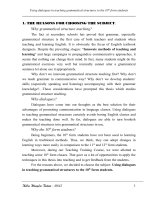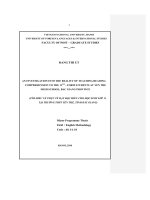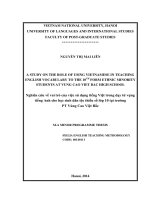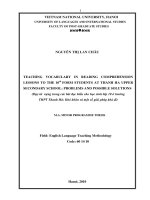Reading comprehension The 10th form 3
Bạn đang xem bản rút gọn của tài liệu. Xem và tải ngay bản đầy đủ của tài liệu tại đây (69.65 KB, 6 trang )
<span class='text_page_counter'>(1)</span>01. Read the text below carefully, and then choose the best answer Early formal adult education activities focused (1) _______ single needs such as reading and writing. Many early programs were (2) _______ by churches to teach people to read the Bible. When the original purpose was (3) _______, programs were often adjusted to meet more general educational needs of the population. Libraries, lecture series, and discussion societies began in various countries during the 18th century. As more people experienced the benefits of (4) _______, they began to participate increasingly in social, political, and occupational (5) _______. By the 19th century, adult education was developing as a formal, organized movement in the Western world. 1. A. in B. on C. by D. for to focuse on sth/sb: tập trung vào cái gì/ai. 2. A. started B. begun C. made D. done "start" và "begin" không có dạng bị động. Ngoài ra ta có cụm từ "make a program": làm, thiết kế, tạo một chương trình. 3. A. interested B. fascinated C. satisfied D. amused interested (adj): thích thú fascinated (adj): hấp dẫn satisfied (adj): hài lòng, thỏa mãn amused (adj): hài hước buồn cười Câu này xét về ý nghĩa ta chọn "satisfied" và được tạm dịch là: "Khi mục đích ban đầu được thỏa mãn, các chương trình được điều chỉnh để đáp ứng những yêu cầu về học tập chung chung của toàn bộ dân số." 4. A. schooling B. learning C. education D. teaching schooling (n): sự giáo dục nhận được tại trường learning (n): việc học hành education (n): sự giáo dục (bao gồm quá trình dạy học, huấn luyện, học tập chủ yếu ở các trường học) teaching (n): sự dạy học.
<span class='text_page_counter'>(2)</span> Như vậy dựa vào nghĩa ta chọn "education" mang ý nghĩa tổng quát trình giáo dục, dạy và học nói chung. 5. A. deeds B. things C. activities D. societies deeds (n_pl): những việc làm, hành vi things (n_pl): những thứ, điều activities(n_pl): các hoạt động societies(n_pl): các xã hội Như vậy dựa vào nghĩa ta chọn "activities" và cụm từ "social, political, and occupational activities" tạm dịch là: các hoạt động xã hội, chính trị và nghề nghiệp. 02. Read the passage, and then choose the correct answer The great English scientist Isaac Newton, whose theory of gravitation is wellknown throughout the world, was born in the little village Wool Thorpe, not far from his own town of Cambridge, on December 25th, 1642. His father was a farmer who died when Newton was fourteen years old. His mother, uncle and grandmother took care of him. When still young, Newton was more of a mechanic than a scholar: His neighbors though he would probably become a well-known clockmaker, because he had already made a clock his neighbors had never heard of before. It worked by water. Besides the water clock Newton also made sundial. When he grew older, he became interested in mathematics and physics. His first physical experiment was carried out in 1658, when he was 16 years old. On June 5th, 1661 Newton entered the University of Cambridge where he studied mathematics and soon became famous at the age of 21. When Newton was 22 years old, he began studying the theory of gravitation. In 1669 he was appointed professor and began lectures on mathematics at Cambridge. Issac Newton dided in 1727 at the age of 85. 1. Newton was not a physics, he was a mathematician. A. True B. False C. No information Ở đây chỉ đề cập tới Newton là một nhà khoa học, chứ không hề nói ông là nhà vật lý hay toán học. 2. He was born in the town of Cambridge. A. True B. False C. No information Ngay câu đầu tiên đã đề cập tới quê hương của Newton "...his own town of Cambridge".
<span class='text_page_counter'>(3)</span> 3. When he was young he was very intelligent. A. True B. False C. No information Chi tiết này không được đề cập tới trong đoạn văn 4. He wasn't very interested in mathematics until he grew older. A. True B. False C. No information Chi tiết này thể hiện rõ ở ý "When he grew older, he became interested in mathematics and physics" có thể tạm dịch là: "Khi cậu lớn lên, cậu trở nên thích thú với môn Toán và Vật lý". 5. His first physical experiment was carried out when he was not yet twenty. A. True B. False C. No information Thí nghiệm vật lý đầu tiên của ông được tiến hành khi ông 16 tuổi. 6. Newton's Laws explained the between force, mass and movement. A. True B. False C. No information Không có chi tiết nào trong bài đề cập tới Newton's Laws. 7. He entered the University of Cambridge at the age of 21. A. True B. False C. No information Newton học tại trường Cambridge năm 1661, tức là lúc 19 tuổi. 8. He became a professor when he was at the age of 30. A. True B. False C. No information Ông trở thành giáo sư năm 1669, tức là lúc 27 tuổi. 03. Read the following passage and choose the best answers to the questions. For the last few months I have spent every Saturday in my flat and have done nothing more exciting than work at home, read the newspapers and watch television. I had begun feeling bored with this and so, last weekend I thought I would do something diffenrent. I rang up several of my friends and we decided to go to London for the day. I was really excited as I hadn't been to London since I was ten. We decided to go by coach as this was by far the cheapest means of transport that was.
<span class='text_page_counter'>(4)</span> available even though it meant that we needed to get up very early. Once in London, we decided to take a sightseeing tour as we wanted to see some of the famous buildings. After the tour we bought some sandwiches and ate them in a small park. In the afternoon, two of us went shopping and the others went to the theater. We met up again at 6:30 p.m. and went to a small restaurant in Soho. The meal was really good but, unfortunately, it took much longer than we had expected. We had to get a taxi back to the coach station. Luckily, we got there just two minutes before our coach left. 1. According to the passage the writer A. usually spends his weekend at home. B. went to London with some of his friends. C. has lived in London for ten years. D. feels bored with his life. "For the last few months I have spent every Saturday in my flat..." 2. He felt so excited about going to London because A. he hadn't been there before. B. he hadn't been there for ten years. C. he went there ten years ago. D. he hadn't been there for a long time. "I was really excited as I hadn't been to London since I was ten." 3. Why did they decide to go by coach? A. Because it was available. B. Because they wanted to start early. C. Because other means of transport were more expensive. D. Because it was one of the most efficient means of transport. "...as this was by far the cheapest means of transport that was available..." 4. Which of the following is true? A. They all went shopping before going to theater. B. They made a sightseeing tour of London and then had lunch. C. They had lunch in a small restaurant. D. They left the city at 6:30 p.m. "...we decided to take a sightseeing tour ...After the tour we bought some sandwiches and ate them in a small park." 5. It can be inferred from the text that A. they nearly missed the coach because of the meal. B. they didn't enjoy the meal in the restaurant very much C. the coach had already left when they got to the station. D. they missed the coach and had to take a taxi back. "The meal was really good but, unfortunately, it took much longer than we had expected...Luckily, we got there just two minutes before our coach left." 04. Choose the best choice Being a student involves (1)_______ responsibility for (2)_______ your own time, therefore, you need (3)_______ about planning your time and workload effectively..
<span class='text_page_counter'>(5)</span> You can learn to do this through practice and through stopping (4)_______ about what works or doesn't work for you. Try (5)_______yourself goals and target give yourself small rewards. Don't try (6)_______ too much at once have regular breaks. If you fail (7)_______ a piece of work as quickly as you expected, don't feel bad, just be more realistic your planning next time. If you find that you avoid even (8)_______ work, stop (9)_______ excuses and (10)_______ today! You will feel much better once you do. 1. A. take B. to take C. taking D. to taking to involve + Ving: bao gồm việc gì 2. A. organize B. organizing C. to organize D. to organizing Sau giới từ (for) động từ thường để dạng Ving 3. A. to learn B. learn C. to learning D. learning to need + to V: cần làm gì 4. A. thinking B. to think C. think D. to thinking to stop + Ving: ngừng làm việc gì 5. A. setting B. set C. to set D. to setting to try + to V: cố gắng làm gì set goals: đề ra mục tiêu 6. A. doing B. to do C. to doing D. doing to try + to V: cố gắng làm gì.
<span class='text_page_counter'>(6)</span> 7. A. finishing B. to finishing C. finish D. to finish fail to V: thất bại trong việc làm gì 8. A. starting B. to starting C. start D. start to avoid + Ving: tránh làm gì 9. A. make B. to make C. making D. to making to stop + Ving: ngừng làm việc gì 10. A. starting B. start C. to start D. to starting "start" ở đây cùng thời với các động từ trước đó là "avoid, stop".
<span class='text_page_counter'>(7)</span>









